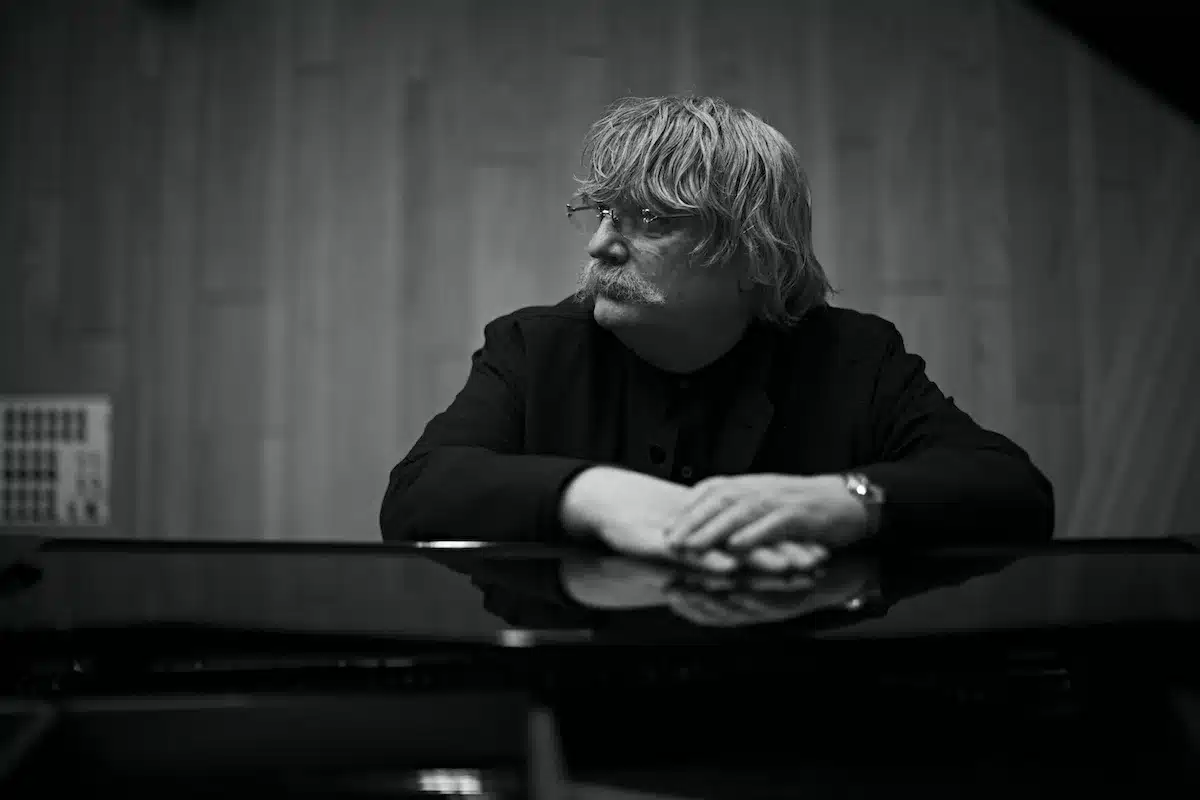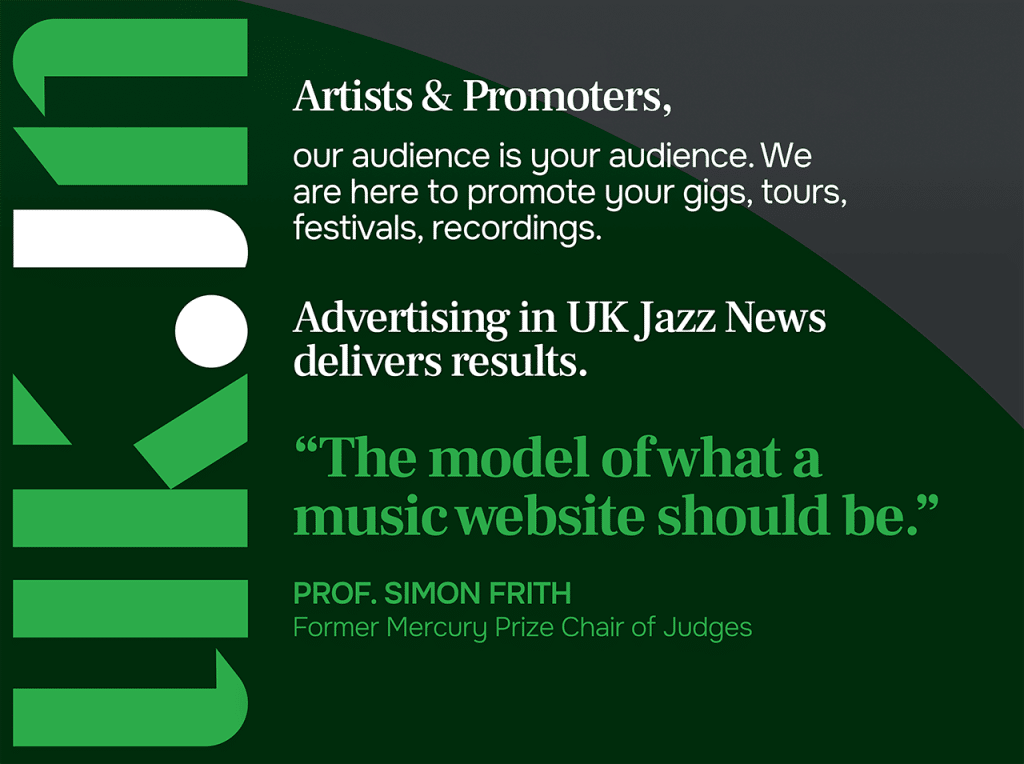The early jazz music of legendary composer Sir Karl Jenkins will feature at this year’s Swansea International Jazz Festival as part of his 80th birthday year celebrations.
Sir Karl, who is also Patron of the Festival, has, together with bassist and composer Laurence Cottle, (whose All-Star Big Band will perform) revisited the old scores and transcribed those that were lost – returning to jazz for the first time in fifty years with some old, some adapted, some revised and some new orchestrations. He will also introduce the concerts.
In that exhilarating decade for jazz, rock, folk and blues between the mid-1960s and ’70s, Miles Davis, Joe Zawinul, Carla Bley, Charles Lloyd, Hermeto Pascoal and many others around the world were making music that bypassed generic differences.
Some of those unfamiliar fusions didn’t work for everyone. There were fans for whom the prospect of bass guitars, synthesisers, and r&b riffs ever being absorbed into the coolly swinging sounds of classic jazz could seem all but sacrilegious. But for many more, the changes were confirmation that a new jazz for a new generation had arrived.
In the UK, that surge launched crossovers of bebop, psychedelia, blues, and r&b, emerging in the music of Soft Machine, Nucleus, the Keith Tippett Group, and jazz-leaning rock bands like Yes, King Crimson, and Brand X. And within that circle at the time, an increasingly sought-after young composer of inviting yet cannily improv-spurring themes was emerging, by the name of Karl Jenkins.
Now, half a century later, a landmark concert featuring large-scale versions of pieces that Jenkins – then a jazz pianist and reeds-player – wrote for Soft Machine and Nucleus, and for influential bandleader Graham Collier’s groups, opens the tenth Swansea International Jazz Festival. Welsh bass-guitar legend Laurence Cottle‘s formidable big band plays nine originals from Jenkins’ jazz years, rearranged jointly by Cottle and the man himself. Jenkins has called the concert ‘Back, Down Another Road’, a reference to a landmark Graham Collier album made during his time with that band.
The composer, now a sprightly 80 – and better known these days as Sir Karl Jenkins, much-lauded creator of a raft of internationally bestselling symphonic and choral music over the past three decades – will introduce the concert, and the word on the wires is that he’s quite likely to sit in on piano too.
The whole show is a celebratory double-header for Jenkins, and for the Welsh jazz scene on which he found some of his earliest musical inspirations. As well as being the composer’s 80th year, 2024 is also a 75th birthday landmark for the Swansea Jazz Club, which has been presenting local and international stars from Stan Tracey and Ronnie Scott to Ben Webster and Woody Herman’s big band in various boltholes since 1949. And in an encouraging uptick for the Festival’s profile, new managers Swansea Council have established a larger venue at the city’s Festival Pavilion, and envisage including its Dylan Thomas theatre in future jazz events.
Though Karl Jenkins’ crowded day-job as a much-lauded composer has rarely touched on jazz since the early 1980s, he has never lost his love for it. But a remarkable career since those days has taken him into very different worlds. He has composed milliion-selling choral albums mixing European and global sources, symphonies, a harp concerto (‘Tros y Garreg’, performed at the coronation of Charles III), award-winning themes for the advertising industry, and his Kosovo-inspired ‘The Armed Man: A Mass for Peace’ has been performed worldwide close to 3000 times since its creation in 1999.
But though the world has latterly come to know this prolific and genially unassuming artist by his official designation (following the 2015 knighthood awarded for services to composition and to the unity of separated genres), Jenkins’ jazz years in a world of small clubs and backroom bars are still vivid to him as precious memories, and formative experiences in his diverse musical life.
So when we hook up on Zoom at the end of May, we begin on what turns out to be a distant mutual recollection – a Nucleus gig at the Fishmonger’s Arms in north London’s Wood Green in the spring of 1970, when the headlong virtuosity of guesting bass guitarist Jack Bruce brought the packed house down, but the freshness of the new band’s ‘Elastic Rock’ repertoire shone through nonetheless. The stealthy footfall of Jenkins’ title theme, with its austere horn hook shadowed and driven by dark Fender Rhodes and guitar fills, and the tenderness of his film-noirish ballad ‘Lullaby for a Lonely Child’ (originally written for Graham Collier) were both highlights of that still-cherished debut album, and are now recast for the Cottle big band’s Swansea show.
‘Nucleus hadn’t long been formed when “Elastic Rock” was recorded,’ Jenkins recalls. ‘But it had already changed a lot from the first meetings we’d had. It was a cooperative band originally, before it became Ian Carr’s Nucleus. The drummer John Marshall, and the bassist Jeff Clyne – who was by then playing bass guitar as well as double bass – and guitarist Chris Spedding, they were all getting into a feeling that was different from jazz swing. But a lot of excellent players didn’t really like the mixture of swing time and rock time. Ray Warleigh, a very good saxophonist, was involved in the original meetings, but he hated that rhythmic mix, so he left before the final line-up was formed.’
Reflecting on that event and others, we recall that the beginnings of fusion was sometimes a divisive issue among jazz fans as well as among performers. I remembered someone at the Fishmongers’ Arms gig telling me ‘you can’t call this jazz’. Friends could even fall out over it.
‘Bit like Brexit,’ Jenkins chuckles. ‘It did get quite heated for a while. But so many bands were becoming popular with more electric sounds and rock rhythms, Miles released ‘Bitches Brew’ and John McLaughlin formed his Mahavishnu Orchestra, Nucleus and Soft Machine and many others were getting noticed over here, so pretty soon people stopped worrying about what time the music was in.’
As befits a living composer still in his active prime and with a huge following, Karl Jenkins unsurprisingly has a crowded schedule for his 80th birthday year. He filled the Royal Albert Hall in March to conduct selections from his orchestral and choral pieces, including from the million-selling ‘Adiemus’, and a full rendition of the cinematically thunderous and linguistically eclectic ‘The Armed Man’. In July he conducts the German premiere of his 2022 choral work ‘One World’, and in August on the BBC Proms, his new saxophone concerto, ‘Stravaganza’ is performed by rising young Cumbrian sax star Jess Gillam, whose quirky personal journey on the instrument inspired the piece.
Yet amid all that, Jenkins’ return to his jazz past is a big priority with him this year, and for reasons that go way back in his personal as well as his musical life.
‘Well, I’ve been president of Swansea Jazz Festival for a while,’ Jenkins explains. ‘I got to know Laurence Cottle pretty well, and his brother Dave, who runs the Swansea Jazz Club really, as well as being house pianist for visiting musicians there. So we got to thinking about my 80th birthday and connection with the festival, and came up with the idea of some new arrangements for tunes I’d written for Graham Collier, Nucleus and Soft Machine, with Laurie’s big band playing them. So there are nine pieces, including some music for a BBC broadcast I did in 1971 for Jazz Club, for a line-up which was Nucleus-plus, with extra saxophones, piano, and vibes. It was a three-movement piece called “Penumbra”, part of which I adapted for a piece called “Fanfare” on “Soft Machine 6”.
After all this time, was Jenkins tempted to change any of these old classics for their big-band renaissance?
‘I felt because they were popular pieces in their day, as it were, I didn’t really want to change them much,’ Jenkins says. ‘I ran them past Laurie and Dave, and I arranged most of the early stuff, and Lawrie did the rest. I’m very happy with it, the band sounded amazing at the rehearsal we had in Wales recently, so I’m really looking forward to the gig.’
I ponder how that almost overnight the jazz apprenticeship of his twenties turned into his status today as one of the most performed living composers on the planet. Jenkins takes up the story.
‘I grew up in a little village outside Swansea, and my father was a church organist and music teacher, so he taught me piano, and I was schooled classically early on,’ he says. ‘But in my early teens, I heard some senior boys at my grammar school playing an LP on the music room record player, and it was Oscar Peterson, going like the clappers. I was hooked from then, read books on jazz, listened to Miles and Art Blakey, and by the time I went to Cardiff University on a music degree I was in love with it. And I didn’t much like what passed for modern classical music at that time, serialism, dissonance and all that. There are dissonances in jazz of course, but there’s almost always rhythm too, and tonality.’
The journey shifted from Cardiff to London’s Royal Academy of Music – by which time Jenkins had caught the attention of British jazz luminaries including Ian Carr and Graham Collier in 1966 at the first Barry Jazz Summer School in south Wales, connections that would soon bring him into the London ensembles of both bandleaders. The rest of his next few years in the 1970s became part of jazz history, but what then triggered the shift toward a life devoting to composing, starting in world of advertising, and moving on to the world’s grandest concert halls?
”I guess after a while I had thought back in those jazz days that there were better improvisers than me around,’ Jenkins reflects. ‘I’ve always loved jazz, and I still listen to it a lot, but I really love writing music too – so I’ve ended up doing what I’m doing now, by one means or another. I did what I did, you know. There was no intention of dumbing classical music down or anything, I just worked with my classical upbringing and understanding of harmony and counterpoint and all that stuff, and my love of melody has always come first. I always refer to myself as a musical tourist. After quite a few happy accidents, that’s the way it’s ended up. But I like to think that what I do is memorable in its way, and perhaps will have longevity. It’s certainly been quite a journey.’
PP features are part of marketing packages
‘Back, Down Another Road: The Jazz Music of Sir Karl Jenkins’ is at 8.30pm, Friday 14 June, on the Swansea International Jazz Festival. The event runs until Sunday, 16 June , with highlights including the Adrian Cox Quartet’s tribute to Sidney Bechet and other New Orleans stars, Denny Ilett’s Hendrix-celebrating Electric Lady Big Band, and Moscow Drug Club’s visits to Tom Waits, gypsy jazz, and more.



One Response